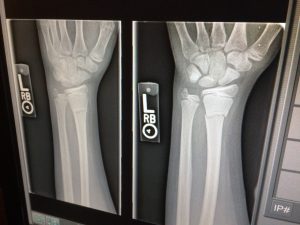 One Friday evening a little over two weeks ago, I decided to do a quick test ride of my road bicycle as part of getting ready for our much-anticipated vacation. As I approached our house, I misjudged a route, lost my balance and took a very hard fall, my left elbow crashing into the pavement. It hurt. A lot. A visit to the urgent care later revealed a broken bone in the joint.
One Friday evening a little over two weeks ago, I decided to do a quick test ride of my road bicycle as part of getting ready for our much-anticipated vacation. As I approached our house, I misjudged a route, lost my balance and took a very hard fall, my left elbow crashing into the pavement. It hurt. A lot. A visit to the urgent care later revealed a broken bone in the joint.
But you know what my first and lingering reaction to all this was? Anger. I was furious at myself for having made an avoidable mistake. I had ruined our vacation plans! If only I had just gone in for dinner instead of getting on my bike. Why hadn’t I ridden a different way, or fallen in the other direction on grass? If only I could change the past! This should never have happened. It wasn’t fair!
 Just as the evil emperor in Star Wars egged Luke on to give into his fury as he fought Darth Vader,the devil encourages anger. But what good does it really do us? Look at this passage in James:
Just as the evil emperor in Star Wars egged Luke on to give into his fury as he fought Darth Vader,the devil encourages anger. But what good does it really do us? Look at this passage in James:
My dear brothers and sisters, take note of this: Everyone should be quick to listen, slow to speak and slow to become angry, because human anger does not produce the righteousness that God desires (James 1:19-20 NIV).
The opposite of being slow to anger is being hot-tempered. Scripture associates a short fuse with the behavior of a fool, and warns us against befriending people who are easily angered (Proverbs 12:16, 22:24). With my broken elbow, what good would my anger do me? As much as I wished life came with an “undo” button, accidents happen. What was done was done, and now I had to choose my response.
![]() Better we deal with life’s ups and downs in a godly way. What have you gotten angry about recently? We might get angry in response to fear (another emotion that’s not from God—see 2 Timothy 1:7). We can also get angry in the face of loss, as I did, when injury stole from me on several levels. Anger may rise up when someone offends us with their words or actions. Whatever the trigger, we can choose whether to become angry, and our choices reveal our level of maturity. The tantrums of the terrible twos, after all, should not be manifesting decades later.
Better we deal with life’s ups and downs in a godly way. What have you gotten angry about recently? We might get angry in response to fear (another emotion that’s not from God—see 2 Timothy 1:7). We can also get angry in the face of loss, as I did, when injury stole from me on several levels. Anger may rise up when someone offends us with their words or actions. Whatever the trigger, we can choose whether to become angry, and our choices reveal our level of maturity. The tantrums of the terrible twos, after all, should not be manifesting decades later.
The Word tells us that we need to guard our hearts. If we fail to exercise self-control, we’re like a city broken into and without walls (Proverbs 4:23, 25:28). On the other hand, “He who is slow to anger is better than the mighty, and he who rules his spirit, than he who captures a city“(Proverbs 16:32). Which one do you want to be, compromised or conquering?
 When we recognize that the devil is the one constantly trying to break in, accuse, disturb, unsettle, and destabilize us, we can channel our anger away from circumstances, others, or ourselves, and instead focus our energy on resisting him (James 4:7, 1 Peter 5:9).
When we recognize that the devil is the one constantly trying to break in, accuse, disturb, unsettle, and destabilize us, we can channel our anger away from circumstances, others, or ourselves, and instead focus our energy on resisting him (James 4:7, 1 Peter 5:9).

